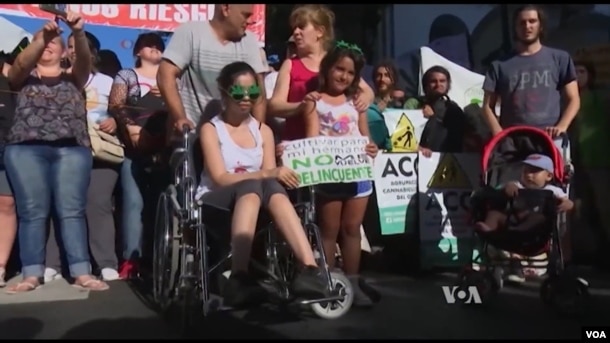
Valeria Salech says her son Emiliano has responded well to cannabis oil. He is now able to smile and interact with her.
Medical marijuana is legal in parts of the United States and several countries in South America. Argentina is not one of them.
But that has not stopped a group of Argentine mothers from growing cannabis illegally at home. They want to help their children who suffer from diseases such as epilepsy and autism.
Valeria Salech’s son, Emiliano, has epilepsy. Traditional drugs stopped the epileptic seizures, but left him unable to smile or socialize. Salech decided to give her 10-year-old son some cannabis oil in December 2015.
“All the mothers remember that first day when we gave the oil to our children,” she told VOA.
She said that within a few hours, her son went from looking at nothing and having no reaction to looking at her and smiling. Salech said she had waited for that moment for 10 years.
“And you just cannot believe it,” she said.

Protesters in Argentina push for legalization of medical marijuana.
She is so confident about its effectiveness that she describes her group as a “public health network.”
“We did what the state cannot do for us – that is to cultivate a lot [of cannabis] to have enough for all of us all the time,” she said.
But there is limited scientific research so far on the medical benefits of cannabis oil. There is also concern about potential psychedelic effects that marijuana may have on children.
Carlos Magdalena is a neurologist for children. He said, as a natural therapy, a small amount of cannabis oil does not have bad side effects. And, Magdalena added, the side effects are less severe than those of legal prescription drugs.
Countries like Uruguay and Chile have already legalized the use of medical marijuana. As the Argentine government is studying its use, Valeria Salech hopes her country will follow next year.
Salech said the government would “find out everything that [she] already know[s]” and that she will continue to grow cannabis for her son.
I’m Alice Bryant.
Faith Lapidus reported this story for VOAnews.com. Alice Bryant adapted the report for VOA Learning English. Hai Do was the editor.
Words in This Story
cannabis - n. the hemp plant (which produces marijuana and cannabis oil)
epilepsy - n. a disorder of the nervous system that can cause people to suddenly become unconscious and to have violent, uncontrolled movements of the body
autism - n. a condition or disorder that begins in childhood and that causes problems in communicating with other people
seizure - n. an abnormal state in which you become unconscious and your body moves in an uncontrolled and violent way
network - n. a group of people or organizations that are closely connected and that work with each other
psychedelic - adj. used to describe a drug (such as LSD) that affects your thinking and causes you to see things that are not real
adverse - adj. bad or unfavorable; not good


No comments:
Post a Comment